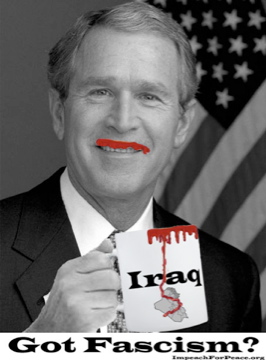The following is a chronological account of the actions taken by the U.S. Military under the leadership of George W. Bush as Commander-in-Chief that lead to multiple violations of the Geneva convention and U.S. Military Code.
General Geneva Violations:
| |||||||||||||
Monday, February 26, 2007
Bush's Impeachable Offenses, Part 4 - War Crimes
Wednesday, February 07, 2007
Bush Leaked on our CIA Agents...
Bush illegally leaked 'cherry picked' information from a classified National Intelligence Estimate. Bush subsequently feigned ignorance of his involvement, keeping the public and the investigators from seeking accountability.
March 25, 2003
President Bush signs an executive order amending (among other things) the legal method for declassifying information. After the administration released classified information, they claimed the release was legal because it had already been disclosed by the media. Ironically, the following quote from the president's own executive order eliminates this defense:
"Classified information shall not be declassified automatically as a result of any unauthorized disclosure of identical or similar information."
The following quotes from the executive order reveal that the process for declassifying information requires a procedure. Contrary to some people's speculation, a president can not simply declassify information via announcement to the media. One requirement is that they inform the head of the related agency (in this case, the CIA) of the planned disclosure:
"the following [declassification instructions] shall appear on the face of each classified document ... the date or event for declassification, ... the date that is 10 years from the date of original classification, ... [or] the date that is up to 25 years from the date of original classification ..."
"Prior to public release, all declassified records shall be appropriately marked to reflect their declassification"
"In some exceptional cases, however, the need to protect such information may be outweighed by the public interest in disclosure of the information ... When such questions arise, they shall be referred to the agency head or the senior agency official. That official will determine, as an exercise of discretion, whether the public interest in disclosure outweighs the damage to the national security that might reasonably be expected from disclosure." (F.A.S.)
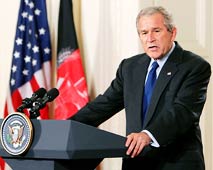 Prior to July 6, 2003
Prior to July 6, 2003
President George W. Bush authorizes Lewis Libby (a former top aide to Vice President Dick Cheney) to leak information from a classified intelligence report to a New York Times reporter, as revealed in Libby's sworn testimony to a federal grand jury in a 39-page Fitzgerald filing on April 5, 2006.
"Vice President advised defendant that the President specifically had authorized defendant to disclose certain information in the NIE." (Fitzgerald filing)
( READ MORE )
George W. Bush authorized the leaking of classified national secrets in violation of executive order 13292 to further a political agenda, exposing an unknown number of covert U.S. intelligence agents to potential harm and retribution while simultaneously refusing to investigate the matter; |
March 25, 2003
President Bush signs an executive order amending (among other things) the legal method for declassifying information. After the administration released classified information, they claimed the release was legal because it had already been disclosed by the media. Ironically, the following quote from the president's own executive order eliminates this defense:
"Classified information shall not be declassified automatically as a result of any unauthorized disclosure of identical or similar information."
The following quotes from the executive order reveal that the process for declassifying information requires a procedure. Contrary to some people's speculation, a president can not simply declassify information via announcement to the media. One requirement is that they inform the head of the related agency (in this case, the CIA) of the planned disclosure:
"the following [declassification instructions] shall appear on the face of each classified document ... the date or event for declassification, ... the date that is 10 years from the date of original classification, ... [or] the date that is up to 25 years from the date of original classification ..."
"Prior to public release, all declassified records shall be appropriately marked to reflect their declassification"
"In some exceptional cases, however, the need to protect such information may be outweighed by the public interest in disclosure of the information ... When such questions arise, they shall be referred to the agency head or the senior agency official. That official will determine, as an exercise of discretion, whether the public interest in disclosure outweighs the damage to the national security that might reasonably be expected from disclosure." (F.A.S.)
 Prior to July 6, 2003
Prior to July 6, 2003President George W. Bush authorizes Lewis Libby (a former top aide to Vice President Dick Cheney) to leak information from a classified intelligence report to a New York Times reporter, as revealed in Libby's sworn testimony to a federal grand jury in a 39-page Fitzgerald filing on April 5, 2006.
"Vice President advised defendant that the President specifically had authorized defendant to disclose certain information in the NIE." (Fitzgerald filing)
( READ MORE )
Thursday, February 01, 2007
Subscribe to:
Comments (Atom)
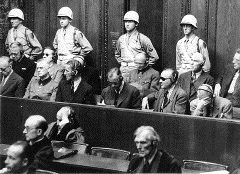 "Whoever, ... commits a war crime, ... shall be fined under this title or imprisoned for life or any term of years, ... and if death results to the victim, shall also be subject to the penalty of death. ... Definition: As used in this section the term 'war crime' means ... a grave breach in any of the international conventions signed at Geneva 12 August 1949 [or acts] prohibited by Article 23, 25, 27, or 28 of the Annex to the Hague Convention IV, Respecting the Laws and Customs of War on Land, signed 18 October 1907 ... " (Section 2441:
"Whoever, ... commits a war crime, ... shall be fined under this title or imprisoned for life or any term of years, ... and if death results to the victim, shall also be subject to the penalty of death. ... Definition: As used in this section the term 'war crime' means ... a grave breach in any of the international conventions signed at Geneva 12 August 1949 [or acts] prohibited by Article 23, 25, 27, or 28 of the Annex to the Hague Convention IV, Respecting the Laws and Customs of War on Land, signed 18 October 1907 ... " (Section 2441: 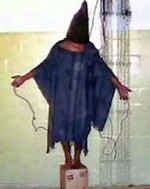 "Prisoners of war must at all times be humanely treated. Any unlawful act or omission ... causing death or seriously endangering the health of a prisoner of war in its custody is prohibited, and will be regarded as a serious breach of the present Convention. Likewise, prisoners of war must at all times be protected, particularly against acts of violence or intimidation and against insults and public curiosity."
"Prisoners of war must at all times be humanely treated. Any unlawful act or omission ... causing death or seriously endangering the health of a prisoner of war in its custody is prohibited, and will be regarded as a serious breach of the present Convention. Likewise, prisoners of war must at all times be protected, particularly against acts of violence or intimidation and against insults and public curiosity."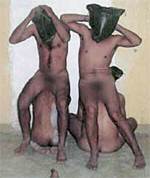 Department of Defense writes a memo which authorizes interrogation tactics for use at Guantanamo including using dogs to induce stress, stripping and shaving prisoners, and stress positions. Also included is a memo with an analysis of how the interrogators at Guantanamo (GTMO) became more willing to conduct extreme interrogation techniques.
Department of Defense writes a memo which authorizes interrogation tactics for use at Guantanamo including using dogs to induce stress, stripping and shaving prisoners, and stress positions. Also included is a memo with an analysis of how the interrogators at Guantanamo (GTMO) became more willing to conduct extreme interrogation techniques. 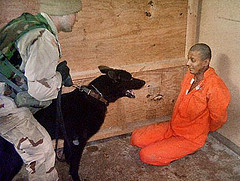 Department of Defense approved: "The use of stress positions ... Use of the isolation facility for up to 30 days ... Extensions beyond the initial 30 days must be approved ... Depravation of light and auditory stimuli ... The detainee may also have a hood placed over his head during transportation and questioning. ... The use of 20 hour interrogations. ... Removal of all comfort items (including religious items) ... Removal of clothing. ... Forced grooming (shaving of facial hair etc.) ... Using detainees individual phobias (such as fear of dogs) to induce stress. ... The use of scenarios designed to convince the detainee that death or severely painful consequences are imminent for him and/or his family. ... Exposure to cold weather or water. ... Use of a wet towel and dripping water to induce the misperception of suffocation." (
Department of Defense approved: "The use of stress positions ... Use of the isolation facility for up to 30 days ... Extensions beyond the initial 30 days must be approved ... Depravation of light and auditory stimuli ... The detainee may also have a hood placed over his head during transportation and questioning. ... The use of 20 hour interrogations. ... Removal of all comfort items (including religious items) ... Removal of clothing. ... Forced grooming (shaving of facial hair etc.) ... Using detainees individual phobias (such as fear of dogs) to induce stress. ... The use of scenarios designed to convince the detainee that death or severely painful consequences are imminent for him and/or his family. ... Exposure to cold weather or water. ... Use of a wet towel and dripping water to induce the misperception of suffocation." (